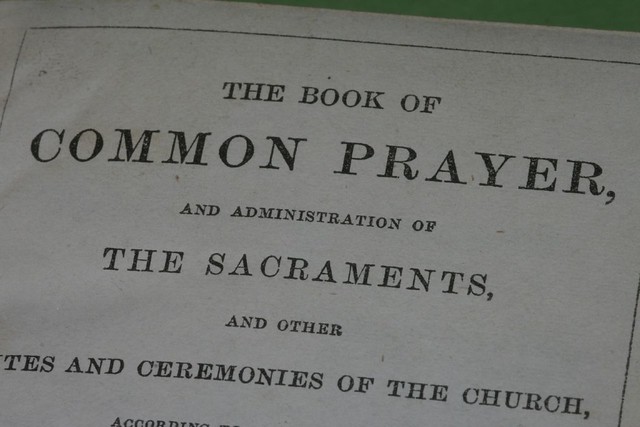Gladness and Singleness of Heart
Most weeks, we end our Sunday morning services at St. James's with this prayer:
Eternal God, heavenly Father,
you have graciously accepted us as living members
of your Son our Savior Jesus Christ,
and you have fed us with spiritual food
in the Sacrament of his Body and Blood.
Send us now into the world in peace,
and grant us strength and courage
to love and serve you
with gladness and singleness of heart;
through Christ our Lord. Amen.
My favorite phrase in this prayer is "...grant us strength and courage to love and serve you with gladness and singleness of heart."
 © 2006 rjp, Flickr | CC-BY-SA | via Wylio
© 2006 rjp, Flickr | CC-BY-SA | via Wylio
The phrase "singleness of heart" leaves a particularly strong impression on me. Perhaps because we live in such a distracted world, and I'm so often doing more than one thing at the same time—checking email and responding to texts while I'm writing, helping kids with homework while I'm cleaning up after dinner and making lunches for the next day—"singleness of heart" sounds like a lovely state in which to dwell and from which to act.
It turns out that this phrase comes from the second chapter of the Acts of the Apostles. This chapter opens with Pentecost, when the Holy Spirit came upon the first followers of Jesus and they spoke in tongues. Peter then goes on to explain to the crowds who witness this miracle what is happening with the Holy Spirit. He testifies about Jesus's life, death, and resurrection, which leads to about 3,000 people becoming baptized as the first converts to early Christianity. The final paragraph describes the new converts' life together, how they held possessions in common and took care of one another. In the poetic language of the King James version, Acts 2:46 reads, "And they, continuing daily with one accord in the temple, and breaking bread from house to house, did eat their meat with gladness and singleness of heart." More modern translations say that the converts "broke their bread with glad and generous (or sincere) hearts."
Generosity and sincerity are both lovely notions, and good Christian attitudes to bring to table fellowship with one another. In the context of Acts, the phrase "singleness [or sincerity] of heart" could refer also to the converts' devotion to one another, even in times of want and need, as well as to God. For me, the phrase "singleness of heart" paints an even more intuitive picture in my head of what it looks like to be in right relationship with one another and with God.
On a purely intellectual level, this phrase leads me to think of God as a singular being, unlike anyone or anything else, and more worthy of my focused devotion—my singleness of heart—than any other thing or being.
Beyond that, this phrase makes me think of those times when I feel a singleness of heart. I think of times when, instead of feeling distracted and frazzled and pulled in a zillion directions, I feel centered, focused, with my heart and mind and body all in the same place. I feel singleness of heart when I've been writing for a while and finally, the words begin to flow smoothly as my fingers fly across the keyboard, barely able to keep up with the ideas and phrases tumbling out of my brain. I feel singleness of heart when I'm listening to a particularly beautiful (or sad or evocative) piece of music, or gazing at the particularly beautiful way that sunlight is hitting the orange-blushed leaves on the maple tree in my front yard. I feel singleness of heart when I stop and really look at one of my children, taking pleasure in the red of their cheeks or the sound of their laugh.
In all of these instances, I encounter God in some way. Not directly, with voices from heaven and such (I've never heard one of those). But I encounter God when I'm exercising the gifts and doing the work God has given me, and when I am attentive to the good and beautiful things created by both divine and human effort.
So on Sunday mornings, when I say those words along with all of you—"grant us strength and courage to love and serve you with gladness and singleness of heart"—I feel a little zing of anticipation, because it feels good to experience clarity and focus in such a distracted, mind-boggling world. I also hear a challenge. Experiencing "singleness of heart" might sometimes happen unexpectedly, but it doesn't come without some effort on our part. Before I get into one of those focused writing grooves, I usually have to sit producing subpar nonsense for hours (or days), and have to be disciplined enough to stick with it even when I'm producing nothing of merit. Attentive looking and listening requires discipline also, a choice to set aside tasks that are not essential and ignore the voices from inside and out that tell us that only very busy people are doing real work. We ask for strength and courage because that's what is required to keep our priorities straight, to do what God is asking us to do even when many other things demand our attention, and to insist on seeking out beauty and goodness and light in a world where it's far too easy to see only what is ugly and sad and dark.
What does the phrase "gladness and singleness of heart" mean for you?
Ellen Painter Dollar is a professional writer and member of St. James’s Episcopal Church. She blogs for St. James’s every Monday, offering reflections on current events, family life, and parish life.
